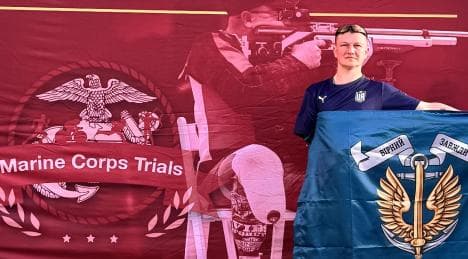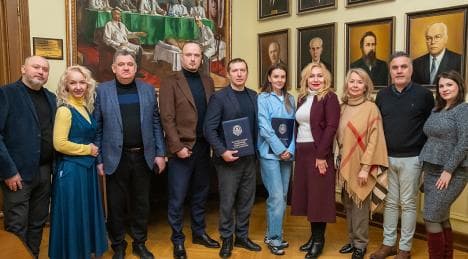Rehabilitation after limb loss is a complex process that goes far beyond physical therapy. Veterans don’t just receive a high-tech prosthesis — they begin a new life, one they must adapt to.
Ukrainian servicemen who received free prosthetics and gait optimization through the Future for Ukraine (FFU) Foundation program joined the amputee veterans' support group initiated by our partner, Medical Center Orthotics & Prosthetics, which recently opened its first office in Kyiv.
The group meets once a month. Veterans who have lost limbs create a space for mutual understanding and support — a safe environment to share experiences, access useful information, and connect with others who have gone through amputation.
The most anticipated part of each training session is the recreational activity. Under the guidance of physical therapists, veterans try out new activities tailored to the season. This time, they took on the Dnipro River on stand-up paddleboards.
Among them was Yan, a soldier from the 3rd Separate Assault Brigade of the Armed Forces of Ukraine, who had the ‘McGregor’ call sign. He discovered a new sport for himself, and emphasized that physical activity is essential for every veteran after the amputation.
“I tried paddle boarding for the first time, and I like it. I wanted to test my balance standing on one leg, but I fell underwater. For two seconds, I managed to stay upright, and ‘Yes!’, I liked it,” he laughed.
The story of “McGregor” — a soldier from the 3rd Assault Brigade
Before the all-out war, McGregor worked as a barber in Poland. “I thought I was living my best life back then. But now I know my best life is here — in Ukraine,” he says.
In November 2023, he returned to Ukraine to join the army. It wasn’t an easy decision — he hesitated for a while — but eventually enlisted in the 3rd Separate Assault Brigade of the Armed Forces of Ukraine. After a month of training in the UK, he joined the 1st Assault Battalion.
“During the first four days on the front line, we were heavily shelled with artillery. The enemy was just 10–15 meters away. We even had ‘conversations’ with some — they threw grenades at us, and we replied... directly to the voice we heard. That was my first combat experience.”
McGregor was harmed by a drone-dropped explosive.
“There’s no way to prepare for it. Russians drop from about 50 meters up. My calf was completely torn apart — there was nothing left to save. Then I waited 12 hours for evacuation. But what matters is the fact that I survived.”
He had his leg amputated above the knee in a hospital in Kharkiv. When asked what keeps him going, McGregor responds with humor:
“No one gave me orders to feel sorry for myself. No leg? So what — I’m alive, and I have a prosthesis now. For one knee I use pain relief gel, for the other — WD-40.”
McGregor plans to return to service to contribute to the fight against the enemy. First, though, he needs to adapt to the prosthesis. He sometimes forgets to charge his electronic knee. As he jokes, “With my memory like a sieve, I’ll need to carry a power bank on my back.”
He recently received a modern prosthesis with an electronic knee and completed a gait optimization program at Medical Center Orthotics & Prosthetics Ukraine thanks to the support of the FFU Foundation. It’s his second prosthesis; the first one had a hydraulic knee.
“Now walking is much easier, especially going up and down stairs,” he says.
“A prosthesis is better than crutches — it lets you keep living your best life, even after an injury.”
“Veterans in our program usually take their first steps on a prosthesis within the second or third day after fitting. But to truly accept the new reality and feel confident using a prosthesis takes a year or more. This is where support and proper rehabilitation are crucial,” says Olena Nikolaienko, President of FFU in the USA.
Paddle boarding is actively used in MCOP in the U.S. as part of the rehabilitation for amputees. This practice has proven effective in recovery. When the body is introduced to a new environment, out of the home or gym, it stimulates new sensory pathways and trains the muscles in unfamiliar ways.
“Besides rehabilitation, mastering a new skill like paddleboarding teaches veterans to control their bodies in a new space. They're not just walking with a prosthesis — they use their upper body, engaging different muscle groups. This combination of physical activity and nature gives the best results. Most of the men are really happy,” says Veronika Kravchenko, physical therapist at MCOP Ukraine.
About the amputee veterans’ support group at MCOP Ukraine
All veterans who have undergone amputation are welcome to join the monthly support group. Meetings take place at the MCOP Ukraine center. Each meeting is based on a group discussion, including lectures and peer support, followed by a recreational activity as a physical rehabilitation component.
At the July session, participants discussed social challenges, self-identity, awkward questions, and public reactions to people with prosthetics. So far, veterans have tried diving and paddleboarding — and are planning to try hockey next.
The Future for Ukraine Foundation, along with Medical Center Orthotics & Prosthetics, has already provided high-tech prosthetics and rehabilitation free of charge to 32 Ukrainian servicemen, with a total value exceeding $2.2 million.
Furthermore, 16 veterans have completed, and 12 more are currently undergoing, a free gait optimization and adaptation program at MCOP Ukraine, which is operating in test mode and preparing for its official opening in Kyiv.




